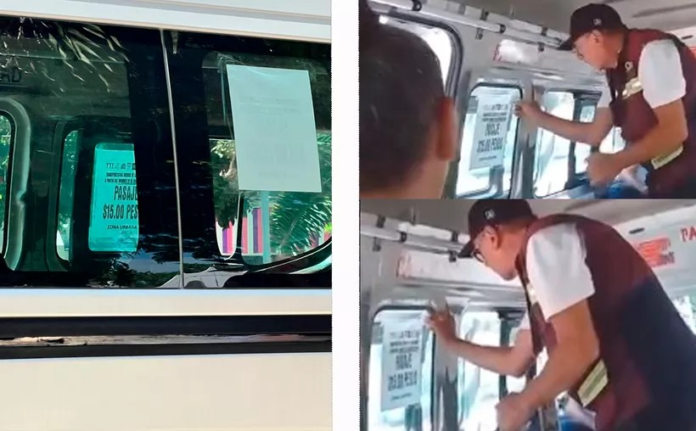/2024/08/21/1724279189409.jpg)
Following complaints on social media and a direct challenge to the authorities, inspectors from the Quintana Roo Mobility Institute are carrying out an operation in Cancun and Playa del Carmen against the unilateral increase in the fares for minibuses and buses in urban and hotel areas.
On social media, the citizens’ displeasure at what is now considered an abuse by unions and public transport concessionaires became evident.
Users shared photos and videos showing their opposition to the signs announcing the increase in fares through posters pasted on the windows of minibuses and buses.
In light of these events, Mobility inspectors carried out an operation in Cancun and Playa del Carmen in which, before the approval of the citizens, they explained that the announcement is illegal, while removing the signs to inform users that, starting this Friday, August 23, the fare would go from 10 to 15 pesos in the urban area, and from 12 to 17 pesos, on buses in the hotel zone.
In addition, other users revealed that the inspectors, before removing the signs, asked citizens if the drivers had charged them extra.
As Novedades Quintana Roo reported in due time, the Quintana Roo Mobility Institute (Imoveqroo) has made it clear that no increase in the price of the fare is authorized.
“The Institute has not approved any rate increase in any form, for any concessionaire, so all these increases, if they occur, would be outside the law,”
Why are they asking for an increase in public transport rates in Quintana Roo?
Leaders and businessmen from the transport sector in Quintana Roo stated that the critical economic situation they are going through makes it necessary to insist on an adjustment to public passenger transport rates.
They expressed their concern because the authorities have not authorized an increase in the price of the service for 8 years.
This is despite the high cost of inputs and the constant increase in the price of fuel, which puts thousands of sources of employment at risk and could even lead to social damage.
Source: sipse






